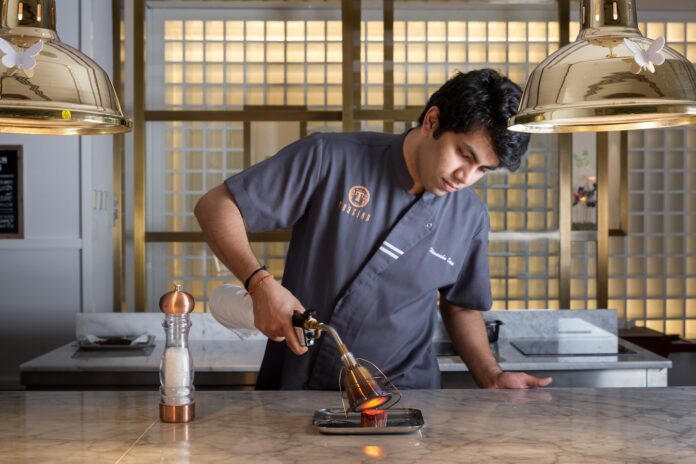DUBAI: Things could have turned out very differently for acclaimed Indian chef Himanshu Saini, who runs the kitchen at Tr?sind Studio in Palm Jumeirah’s Nakheel Mall. Right now, he’s one of the hottest properties in Dubai’s dining scene: Saini basically has free rein to create his own tasting menus for the 18-seat Indian fine-dining restaurant (he changes the menu up every four months) and has established it as one of the must-visit venues in the city. Tr?sind Studio was awarded a Michelin star in the prestigious dining guide’s first Dubai edition earlier this year.
But he very nearly didn’t come to the Middle East at all. In 2014, the Delhi native was working as an executive chef in Mumbai when he was offered what seemed like a dream job in New York.
“I was looking forward to it. I’d had this offer from Dubai to open Tr?sind, but New York is New York, so I’d decided I was going to go there,” Saini says. “But I was really struggling in America: I wasn’t happy with the team, I wasn’t happy with the concept of the restaurant, I wasn’t being given a free hand to work the way I wanted to work, so within a month I decided to come to Dubai and take the opportunity to launch Tr?sind.”
He hasn’t really looked back since. Which is perhaps as well, because as Saini tells it, there has never been a Plan B for him.
“Cooking was something I always loved. I grew up in a big family, living in my grandparents’ house with about 50 people — extended family. So even though it was a home kitchen, it was run like a professional kitchen where everybody has an assigned job. Growing up in those surroundings, and in Delhi — which is a big foodie hub with lots of unique street food — I was always surrounded by food.
“In India, being a chef — 10 or 20 years back — wasn’t really a career your parents wanted you to pursue,” he continues. “Everybody in India wanted their children to become a doctor or an engineer, or a lawyer. But I wasn’t good at anything else. This career wasn’t really a choice so much as a necessity.”
Here, Saini discusses flavors, theater, and the importance of simplicity.
Q: What’s your top tip for amateur chefs?
A: When I cook, I try to maintain a harmony of flavors. I don’t shy away from using salt in desserts or something sweet in savory preparations. These are all mental blocks that cooks can have. A recipe is useful as a reference, but it’s always best to use your own palate. I always say to younger chefs that you should cook something you’d eat yourself a hundred times. If it’s tasty to you, then it’ll eventually be appreciated by others.
Is there a single ingredient that can instantly improve most dishes?
The generic answer would be salt. Like I said, I don’t shy away from using it in my desserts. But cooking isn’t about just one ingredient. And, for me, the humble ingredients in the kitchen are more important than any luxury ones: I don’t use expensive meat, I don’t use foie gras, or caviar — I’ll only use it if I can make better use of it than just serving it on top of a dish. The tomato is more important in my kitchen than truffle. The umami in the tomatoes is probably as good as the umami in the truffles; you just have to know how to respect that.
What’s your favorite cuisine?
I always look forward to Indian or Thai food the most. They’re two cuisines which are very flavorful and full of aroma.
What’s your favorite dish to cook?
My menu will sometimes have three or four broth preparations. It’s something I always look forward to. I find peace when I’m cooking broths. It’s so harmonious: You can have so many flavors. It’s delicate and needs a deft hand, but at the same time it’s full of aroma and flavorful. It’s something that a lot of people get wrong, but a good hearty soup or a good bouillon is something that’s one of my strengths. I get all the flavors in the liquid, but it’s still delicate and flavorful. I find peace in simple things: A few spoonfuls of broth can make my eyes light up.
When you go out, do you find yourself critiquing the food?
It depends. Sometimes I go out to eat because I want to see what other restaurants are doing. In that case, I try to pick restaurants that I look up to and my professional side kicks in. But it totally depends on my intentions. If the intention is just to relax with friends, then I don’t judge — I’m not thinking about how the sauce is seasoned, or how the pasta is cooked. My brain won’t work in the same way as it does if I’m going out to, say, Ossiano, when I want to know what thought process has gone into the dish, why certain combinations have been used, where the ingredients have been sourced from.
So you’re able to turn your chef’s brain off sometimes?
Yeah. When I’m having a good time with my friends, I keep my mouth shut.
What request or behavior from customers most frustrates you?
Since we’re a tasting-menu restaurant, the experience can take up to two hours. We do it that way because, for every preparation, the temperature is important, the way it’s being eaten is important… So I do get frustrated when people say, ‘Can you bring everything together?’ If it’s all served together, it’s not the experience we want to give. We want to be sure we’re serving the dishes at the right temperature, with the right texture. These small details make a big difference on your palate. A dish that has been kept on the table for more than two or three minutes, for me, is not as it should be.
At home, if you need to cook something quickly, what’s your go-to dish?
I’d probably make a spaghetti al olio. It’s my kind of dish: Super-easy, super-quick. My house is pure vegetarian — no meat, no eggs. My wife is pure vegetarian, so I don’t cook eggs at home, otherwise I would’ve said an omelet.
As a head chef, are you a disciplinarian?
No. I’m the opposite. In Tr?sind Studio we have a maximum of 18 guests at one time, and we turn around two seatings every evening. All the guests face the open kitchen. For me it’s like a theater. I really enjoy working like that, I can see every guest and whether they’re liking it or not. In the kitchen, everybody’s doing their job and enjoying it. It’s very peaceful. It’s not a busy kitchen with loud noise. For me, it’s like meditation. You get that kind of vibe; everybody’s calm. Everybody knows what’s expected from them and I trust my team and I’m super-proud of them.


